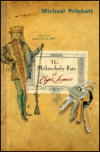The Melancholy Fate of Captain Lewis
Meriwether Lewis can’t achieve death, much less the Northwest Passage. And his modern counterpart, Bill Lewis, can’t connect with himself, let alone the students he’s trying to instruct. Bill is simply stymied by his own life, and the suicidal end of Meriwether’s.
Why do people kill themselves at all? Can we ever get beyond dreams and learn to find contentment in the cold comfort of reality? Hard questions, these, but novelist Michael Pritchett doesn’t hesitate to raise them in his debut novel, The Melancholy Fate of Captain Lewis.
Pritchett’s novel focuses on two main characters: Captain Meriwether Lewis, the real explorer of Lewis-and-Clark fame, and Bill Lewis, a fictional English professor trying to write a book about Meriwether. You’ll soon find that the men share more than a last name – they’re both wrestling with the angel of despair, and the odds aren’t in their favor.
The novel’s a sometimes uneasy mélange of historical fiction and more modern fiction as Pritchett juggles alternate narrative threads. He shuttles between Meriwether, whose sections are rife with period language and often actual diary excerpts, and Bill’s narratives, which reflect his more prosaic, suburban existence.
Diction may challenge some readers here. While Pritchett is striving for authenticity, and the way he allows the language of nearly two centuries ago to gradually supersede Bill’s modern English is fascinating, it occasionally feels contrived.
For example, the passage “During the day, he and the men pursu’d the elk in the wood, and were dreadful, all trussed up in the skins of their quarries, with noise sticks spitting smoke and deadly cinders,” is both elegant, and a little forced.
More problematic are matters of structure and theme. The back-and-forth weave of narrative is transparent, but it’s less easy to understand why the same facts and feelings are often repeated in both Meriwether’s and Bill’s sections. This patchwork quality results in a slightly jarring déjà vu effect, though it does add layering.
Thematically the men could be kissing cousins. It’s here, the theme, where I most want to applaud Pritchett for his ambition. He’s really wading into thick stuff here, digging into depression, existential angst, fear of death and the longing for it, loneliness, and the frustrations, apparently common to both backwoods explorers weighed down by historic obligation and modern men struggling with fraying family responsibilities.
The men also share a fascination with, and for, women, particularly those already married. (One gets the sense Pritchett really means Women with a capital ‘W,’ in perhaps a salute to Sacajawea’s undoubted historic contribution, or modern feminist freedoms.) But in the end, women play more the part of sirens than comforters, and the men remain staunchly unable to attain happiness in romantic relationships. One could argue they purposely seek inappropriate women to foil themselves and confirm their own worst fears: that they explore hard wilderness alone, beyond the help of any map or wedding band. Meriwether drinks and wanders; Bill chain-smokes and neglects his pills. Both sleep roughly; neither man is eager to rise.
But it’s Bill’s compulsion to understand Meriwether that drives the action and makes us keep turning Pritchett’s pages. We, too, get caught up in the quest to understand Meriwether’s lonely mind, and along the way find ourselves intrigued by Bill.
The man can seemingly stimulate great class discussions, at least partially connect with his anorexic son, and draw interest from a multitude of women. He even manages to repair bathroom tiling, but his reason for being eludes him; he’s under the impression that the motive for Meriwether’s suicide will provide the answers to his own floundering life.
At the novel’s opening, witness Lewis’s approaching death: “Perhaps it was not too late to feel! But a nameless, bottomless thing said there was nothing. An explosion threw up colours to the west, and the sun fell into the sea, making clouds from the steam. Slowly, two worlds ground their way into each other, like lovers, and eras’d his time.” A little bathetic. Possibly too close to the bone. And not really an explanation of suicide.
But what is that motive? Do we even really want to know? And can we?
In the search for these answers you could do worse than start with The Melancholy Fate. Despite its occasionally repetitive, sometimes strained moments, Pritchett’s work holds our interest, and it’s a more than satisfying read for those in search of ambitious, literary history willing to explore the wildness around and inside our very selves.





